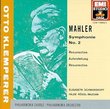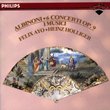| All Artists: Buektoff, Icelandic Opera Choir Title: Rachmaninov: Mona Vanna Act 1 / Piano Concerto No. 4 Members Wishing: 0 Total Copies: 0 Label: Chandos Release Date: 10/28/1992 Genre: Classical Styles: Opera & Classical Vocal, Forms & Genres, Concertos, Instruments, Keyboard Number of Discs: 1 SwapaCD Credits: 1 UPC: 095115898727 |
Search - Buektoff, Icelandic Opera Choir :: Rachmaninov: Mona Vanna Act 1 / Piano Concerto No. 4
 | Buektoff, Icelandic Opera Choir Rachmaninov: Mona Vanna Act 1 / Piano Concerto No. 4 Genre: Classical
|
Larger Image |
CD DetailsSimilar CDsSimilarly Requested CDs |
CD ReviewsHooray! Finally, The DEFINITIVE 4th Concerto Avrohom Leichtling | Monsey, NY | 10/15/2004 (5 out of 5 stars) "Sergei Rachmaninov juggled several different musical careers during the course of his life: composer, pianist, conductor. He lived through the tumultuous years of the Revolution and engaged in a performing career of Olympian proportions. His catalogue of completed works is shorter rather than longer, and some of the major pieces went through significant revisions.
One of the most troubled of these pieces, but also one of the most original, is the Piano Concerto in G minor, Opus 40. Begun as early as 1916, Rachmaninov did not complete it until 1927. It's first performance received scathing critical condemnation. In 1941, he produced a second, presumably "improved" version of the work, and this version is in common useage. Most performances of this revised version attempt to make the piece into a virtuoso showcase - tempi, which the composer does not specify (in terms of metronome markings), are almost always taken at breakneck speed. The result is that the concerto's extremely concentrated formal structure comes off sounding like a series of disconnected episodes. By this point, Rachmaninov was moving towards a much more concise, if no less rich idiom. The original version of the concerto has not had much play for "all the usual reasons." The original critical reviews have left people unwilling to explore the concept as originally conceived. This is a shame, since the original work is one of Rachmaninov's masterpieces - its construction is air-tight, its musical logic absolutely cogent from first note to last. Its difficulty is that it requires performers to be sensitive to its internal logic. This means, we can not play it "as fast as possible." Igor Buketoff, whose performance of the work (with the Iceland Symphony Orchestra and pianist William Black) is paired with his own orchestration of Rachmaninov's unfinished opera Monna Vana, has finally given a reading of the piece that allows the work to shine in all its deserved glory, difficult as it is musically. Buketoff, who knew Rachmaninov, heard directly from the composer "how it should go" - and the performance here is moderate in its tempi, and absolutely clear in its details. Going through both versions of the concerto with the scores, it is easy enough to see not only how, but why Rachmaninov made the structural changes he did. The result of this are two similar but very different views of the same composition. Having grown up with the revised version, the original version was a revelation. When, after so many years, I happened on this recording, I was at first skeptical - expecting the usual temporal distortions. But, lo and behold, here at last was Rachmaninov played in a wholly appropriately thoughtful manner - not sluggish, not hysterical, but with exactly the kind of elasticity that this work needs. The slower tempos allow the music to be heard in its correct proportions. The results are magical. I would not trade off one version for the other. Consider them as if you had a first cousin as a fraternal twin. Here, at last, is the 4th concerto as Rachmaninov wrote it originally - a wonderful, carefully wrought piece, and one that demonstrates how clearly and precisely its composer worked. Absolutely recommended at the highest level." |

 Track Listings (7) - Disc #1
Track Listings (7) - Disc #1






